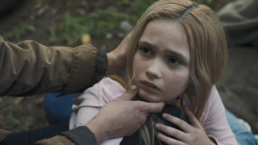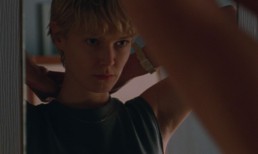Esme, My Love
Through the power of the mother-daughter connection, director Cory Choy's feature film debut Esme, My Love acts as a poignant meditation on life and loss. Set in the sprawling backwoods of an isolated forest, this relationship-based drama between a young mother and her terminally ill daughter captures not only the timeless beauty of all living things but also the mysterious possibilities of a life beyond Earthly existence.
Esme, My Love is told through the lens of magical realism. A gentle hum opens the film under an echoey voiceover between Hannah (Stacey Weckstein) and her young daughter, Esme (Audrey Grace Marshall). What initially seems like a somewhat spontaneous camping trip quickly becomes something more intentional. The next few days are spent hiking and camping in the woods until the pair eventually reach an abandoned farmhouse. The house, rickety and clearly left vacant for several years, is what Hannah is hoping holds the key to unlocking precious memories for Esme before it's too late.
From there, the film unravels into darker and more mysterious territory. Hannah's desperation to connect with her daughter before she loses her for good becomes more erratic and psychologically draining. Esme's more subdued nature reflects one of acceptance, even if she doesn't fully realize her condition and fate, while Hannah's distress continues to agitate Esme. Esme doesn't understand her mother's persistent pleas to recall memories and therefore grows more frustrated day by day. But Hannah will stop at nothing to make this connection with Esme one last time.
The film was completed over six years and is considered a micro-indie in every sense of the word. Some scenes were shot on an iPhone because of faulty camera equipment (but you would never be able to tell which moments). The surroundings are beautiful, color-corrected like a big studio movie, and shot with such detail. The intimate two-person cast and outdoor setting no doubt was a cost-effective choice but it also works so well for the story that director Cory Choy is trying to tell. The atmosphere feels complete when it's set against composers Stephanie Griffin and Charlotte Littlehales' mesmerizing score. The heaviness of the music–which includes violin, strings, and synth–adds to the claustrophobic nature of the situation.
In Esme, My Love, audiences bear witness to a layered spiritual horror film. It is a slow burn in a lot of ways and doesn't make the character's intentions immediately clear. Like Esme, it's easy to get confused about what is happening – what is real and what is surreal – but trust in the film's narrative journey will lead you to the other side with acknowledgment of this powerful filmmaking feat.
Biosphere
One of my favorite indie films of the last decade is the romantic dramedy The One I Love, directed by Charlie McDowell and produced by Mel Eslyn. Starring Mark Duplass and Elisabeth Moss as a couple falling out of love, the simplicity of the storyline is sprinkled with absurd moments throughout and ends with a jolt of frenetic energy from a twist in the final scene. For all of the WTF moments though, it stays grounded in reality, leading us to believe that this situation could happen to any one of us watching. This is a nearly impossible tone to achieve in an indie film, and the filmmakers made it look easy. It’s no surprise that I had high expectations going into Eslyn’s directorial debut, Biosphere–would this be my new cult favorite? The short answer: no.
In Biosphere, Eslyn (a lauded producer and President of Duplass Brothers Productions) returns to familiar territory with another unconventional “love” story about choice and reckless abandon. Mark Duplass and Sterling K. Brown are the only two actors in this incredibly intimate story about survival. Billy (Duplass), former President of the United States, and his childhood best friend Ray (Brown) are the last two men to escape from a doomed Earth (its demise unknown). They are a number of days into their isolation in a handmade personal biosphere, constructed by Ray who happens to be an incredibly gifted scientist. The biosphere was built to sustain life in perpetuity; the hydroponic garden and fish pond provided vegetables and protein, the scholarly books intended to stay sharp, and the video games were selected for fun.
Their daily routine is the same, with no cause for concern, until the last remaining female fish dies. With only two male fish left in the tank with no way to procreate, Billy and Ray begin to accept that the end is near. Starvation is inevitable. However, one of the male fish goes through an unbelievable transformation overnight, giving a glimmer of hope that survival is still possible. Life finds a way, as adaptation and evolution have proved over time. Billy and Ray are about to learn firsthand just how far the human body will go in order to survive.
Biosphere can be best described as a sci-fi buddy dark comedy. The performances from Duplass and Brown are equally balanced, their dynamic easily carries the film for its entire 1h 46m runtime. They both play into each other's comedic strengths without feeling like Dumb and Dumber. The plot, on the other hand, is out of this world, too bizarre to have any lingering feelings of “could this happen to me?” that The One I Love so expertly crafted. The problem here is the lack of an emotional hook. As a female viewer (a clarifying factor that makes more sense after you’ve seen the film), I felt like the script had more misses than hits when relating to the female experience and bodily functions. While funny at first, the evolution began to feel tired and drab. Perhaps cutting 20 minutes or so could have freshened up this already claustrophobic dramedy.
While Biosphere fell short of my expectations, the film is still an enjoyable watch for its inclusion of themes like gender, sexuality, love, and the human capacity to change and evolve. For a two-person, single-setting film, it is an impressive accomplishment. Award-winning film composers Danny Bensi and Saunder Jurriaans create a moody and tense atmosphere with a primarily vocal score, using hums with the utmost suspense. I may not have connected with Biosphere, but I applaud the unique vision and can’t wait to see what director Mel Eslyn does next.
Distributed by IFC Films. In select theaters this Friday, July 7th.
The Last Autumn
Coming to VOD and digital today is the 2019 documentary The Last Autumn, a sweeping portrait of how a family of farmers encourages slow living in the Icelandic countryside. Directed by Yrsa Roca Fannberg, the film embraces the stillness of the present by centering its story around an elder couple, Úlfar and Oddny, who fight to preserve their ancestral traditions against an environment of constant evolution.
Shot on 16mm film, The Last Autumn opens in black and white before transitioning into the colorful and picturesque image of Iceland we're used to seeing. Úlfar and his wife Oddny live in the quaint seaside parish of Árneshreppur, a town in the Westfjords of northwestern Iceland. They lead a quiet life and have settled into a nice little routine tending to their lambs, ewes, and dogs.
Úlfar is the last in a long line of farmers, going as far back as the first settlers to Iceland centuries ago. When Úlfar and Oddny's grandchildren visit from the "big city" of Reykjavik (population: 139,875) to help with the seasonal sheep herding for the summer, the couple recognizes that due to their children and grandchildren's lack of interest in rural traditions and a desire to assimilate into modern society, this will be the family's last communal farming obligation. That summer marked the end of an era.
This slice-of-life observational documentary is an ode to living in harmony with nature, animals, and the seasons. It poetically shows that life is like a spiral; seasons repeat themselves and new beginnings are always on the horizon. We cannot stop or slow down time, only embrace what we have in the present moment and be grateful for it.
The Last Autumn is a mood-setting film. It's not plot or exposition-driven. Rather, it has a meditative quality that feels like a long, deep exhale, bringing a sense of rejuvenation and gratitude to the viewer after watching. Visually, it is captivating from start to finish. At times the cinematography even dips into an eerie territory. If seen out of context, the shot of the farmers herding the sheep down from the mountain could easily be mistaken for an Ari Aster film. The score by multi-instrumentalist Gyða Valtýsdóttir is deep and bassy, breathing an ethereal quality into Úlfar's poignant odyssey.
An official selection at multiple festivals including CPH: Dox, HotDocs, and a Special Jury Mention in the New Visions Competition at the Reykjavik International Film Festival, The Last Autumn is a time capsule of a simpler time and a love letter to past generations.
A Song For Imogene
A woman breaks free from the metaphorical chains of abuse in Erika Arlee’s heartfelt drama, A Song For Imogene. Set in a nondescript rural town in the South, the first-time writer/director uses the character of Cheyenne to give a voice to all of the women who have ever felt the constraints of being trapped in an emotionally abusive relationship.
Cheyenne (Kristi Ray) is struggling. Faced with an unexpected pregnancy and a manipulative partner who has a habit of getting out his aggression at her, Cheyenne has reached her breaking point. Desperate for refuge from her chaotic environment, she returns to her childhood home where her mother still lives, who she hasn’t seen in some time. It’s clear that their relationship is contentious and the reunion is lukewarm at best. Unfortunately, Cheyenne and her mother never get the chance to properly reconnect after she unexpectedly passes away overnight. Faced with unwanted change in all aspects of her life, Cheyenne is forced to make some difficult decisions that, while challenging, enable her to begin living with conviction.
Filmmaker Erika Arlee pours her heart and personal experience into A Song for Imogene as she divulges that her past involvement in emotionally abusive relationships was part of the inspiration for the script. As therapeutic as it must have been to create, the film’s grounding central character and universal appeal keep it from feeling too nuanced. The authenticity that radiates from the screen – from the story itself to the locations, music (including a cover of 'Delta Dawn' by Tanya Tucker), and costumes – feels like a breath of fresh air.
The film is a slow burn, which adds to the authenticity of the story. Life-changing decisions typically don’t happen overnight, they are a methodical building blocks of confidence that takes time to construct before one feels ready to break free. In A Song For Imogene, we witness Cheyenne taking baby steps on her journey toward self-independence. If this film had a sequel, that’s where we would see her really take off.
A Song For Imogene, which made its World Premiere at the 2023 Bentonville Film Festival, lives in the same universe as To Leslie, the film that led to Andrea Riseborough’s Academy Award nomination. Both films show the grit and determination of a woman who is committed to changing her life for the better. Kristi Ray gives a phenomenal performance as Cheyenne, a woman on the verge of a breakdown. McKenzie Barwick, who plays Cheyenne’s estranged sister, Janelle, offers a complexity that adds necessary tension. Their dynamic feels truthful and rewarding to observe.
Female-led both in front of and behind the camera, A Song For Imogene is ultimately an optimistic tale about self-perseverance and the power of independence. Cheyenne had to lose what she thought she wanted to gain what she actually needed, and that is a powerful message that deserves attention.
Falcon Lake
Canadian actress Charlotte Le Bon makes her feature-length directorial debut in the melancholic coming-of-age film Falcon Lake. Billed as "a love and ghost story," the film is loosely based on the 2017 graphic novel "Une Sœur (A Sister)" by French comic book artist Bastien Vivès. While not a direct adaptation, Falcon Lake emphasizes the book's theme of an adolescent's awakened desire, both in an emotional and physical sense, and creates a swirling portrait of young adulthood in its earliest stages.
Falcon Lake tells the story of Bastien (Joseph Engel), a shy teenager who spends his summer vacation at a lakehouse with his family and his parent's close friends. Set against the glistening lake and pristine wilderness of the Quebec countryside, the beauty of Bastien's surroundings is breathtaking, to say the least. However, like most boys his age, he is apathetic to the environment and would rather spend time on his Nintendo than in nature. It isn't until Bastien meets Chloé (Sara Montpetit) – the daughter of his parent's friends – that he starts coming out of his shell. She is a few years older than he – three to be exact – and also comes with a teenager's attitude. When she's tasked with watching Bastien and his younger brother while their parents rendevous at the cabin, she makes it obvious that she'd rather be doing anything else. But over time, she slowly softens up and welcomes him into her world.
Chloé has a dark sense of humor, which Bastien at first finds intimidating before becoming infatuated. Chloé ushers Bastien into young adulthood, from underage drinking at a local house party to dares that involve wading in the lake's murky water which, legend has it, is occupied by a ghost. At the height of their time together, Bastien is so quietly in love with Chloé that he would follow her anywhere she wanted. However, the audience is quick to realize that these feelings are mostly one-sided and this summer romance is most likely to end in heartbreak.
Falcon Lake is not your traditional coming-of-age film. There's a maturity here that offers a new perspective on how we view growing up and the innocence of childhood crushes. Charlotte Le Bon lenses an empathetic eye to this confusing period of life, making it easy to relate to both Bastien and Chloé. The film has an overall breezy feeling to it that delightfully makes it feel like a time capsule from the cinema of the 70s. Le Bon's decision to shoot on 16mm film gives the visual aesthetic a home video quality that encapsulates the feeling of summer. Perhaps more pointedly, the delicate score arouses a slightly ominous tone. Composer Shida Shahabi uses a combination of classical and contemporary techniques to create a dreamy soundscape for the central characters to get lost in.
A Golden Camera nominee at the 2022 Cannes Film Festival, Falcon Lake is a wholehearted and impressive feature debut. Le Bon confidently captures the indescribable significance of transitioning from childhood innocence to young adulthood eloquently and naturally. It's a bright and promising start for Le Bon and all involved.
Distributed by Yellow Veil Pictures. Now available on VOD.
The Problem of the Hero
As a storyteller, do you have the right to portray an experience other than your own? That is the overarching question in director Shaun Dozier's film The Problem of the Hero. Running just shy of 90 minutes, the film is a fictional interpretation based on a real-life event that occurred between two 20th Century literary giants, sparking a philosophical debate about personal & creative agency.
The Problem of the Hero takes place in March of 1941, at the St. James Theatre in New York. American author Richard Wright (J. Mardrice Henderson), most famously known for his best-selling novel Native Son, and Pulitzer Prize-winning playwright Paul Green (David Zum Brunnen) have been collaborating to adapt the aforementioned Native Son into a Broadway play.
However, only days before the play is set to make its debut, Richard and Paul face a disagreement on how the play should end. The difference of opinion evolves into a deeper debate over issues of race, social justice, politics, and creative expression. Despite respecting each other's points of view, the men find it hard to reach a solution, threatening to end their friendship and putting the play in jeopardy.
A couple of things are important to note here. First, Richard is a Black man, and Native Son was written partly based on his own experience growing up surrounded by racism in the American South. Paul, on the other hand, is a White man who has never personally experienced such hardships. Although he sympathizes with Richard's struggles, he cannot truly empathize.
Ironically, the story of Native Son is a meta-reflection of what is playing out on screen between Richard and Paul. The book – which is referenced throughout the film when the characters act out scenes from the play – is a story about oppression and addresses the responsibility that White people have to create space for Black people to tell their own stories.
Shaun Dozier's film is not a lighthearted affair, both thematically and visually. The cadence of the dialogue has a classic film-like quality to it with trans-American accents dominating the conversations. It is very dialogue-heavy as well, reminiscent of a stage play with intricate lines of dialogue bouncing between the characters. This non-traditional speaking style is a refreshing nod to the 1940s time period that Dozier is replicating.
Visually, The Problem of the Hero takes on a muted, slightly washed-out tone. Perhaps this is a budget-indicative choice but I believe the film could have benefitted from a sharper, more saturated color grade.
“We can only succeed as a society when we understand the things we haven’t experienced ourselves,” says Paul Green toward the film's end. This sentiment is a divisive one that is still being argued today, as seen in the discourse surrounding Peter Farrelly's Green Book, Kathryn Bigelow's Detroit, and John Singleton's 2013 Op-Ed in The Hollywood Reporter, "Can A White Director Make a Great Black Movie?". The Problem of the Hero adds another perspective to this continued conversation and offers a point of view that will get audiences thinking.
Blue Jean
We're halfway through 2023 and I can confidently say that writer/director Georgia Oakley's Blue Jean has a snug place on my forthcoming list of favorite films of the year. This indie gem–winner of the Venice Film Festival’s People’s Choice Award and four British Independent Film Awards–is not only a confident directorial debut, but an achingly resonating drama about one woman's desperation to safeguard herself when her livelihood is threatened.
In a phenomenal lead performance by BIFA-winning actress Rosy McEwen, Blue Jean captures the life of a closeted queer woman living against the backdrop of Margaret Thatcher’s conservative England. The year is 1988 and P.E. teacher Jean (McEwen) rounds up her squirrely class of high schoolers to discuss the day's topic: fight or flight. Honing in on the fact that one doesn't decide how to react, but rather this instinct is innate and unique to each of us, Jean soon faces her own fight or flight dilemma. Mounting political pressure from the right pushes a new law, Section 28, into the forefront of conversation among her colleagues, who are unaware of Jean's sexuality. The law, which is equivalent to Florida's "Don't Say Gay' bill, prohibits the "promotion of homosexuality" by local authorities, essentially intimidating all queer men and women into silence.
As the prospect of living under this proposed government regime infiltrates Jean's mind, her girlfriend, Paula (Lainey Shaw) is someone who doesn't seem too affected. With a shaved head, piercings, and a leather vest to complement her motorcycle, Paula is the definition of a woman who is not interested in anyone's opinion. This confidence scares Jean, who finds herself downplaying their relationship when out in public or caught off guard.
Jean's hidden secret is further challenged when a new student enrolls in her class. 15-year-old Lois (Lucy Halliday) is unlike the other girls, she keeps to herself and doesn't care to assimilate into the school environment. One night, at the gay nightclub Jean and her group of friends frequent often, Jean spots Lois at the bar. Terrified that Lois may out her, Jean is quick to realize that she needs to be very cautious about how she approaches Lois from here on out. It's a delicate dance between teacher and student, which culminates into a crescendo in the film's final act.
Blue Jean is a stunning and meticulously beautiful feature debut from Georgia Oakley. A debut like this feels few and far between, creating a sense of both wonderment and disbelief that such talent has been discovered. Much in the same way that Charlotte Wells' Aftersun stunned audiences with its unexpected greatness, Blue Jean deserves the same attention.
The film grain adds a layer of visual aesthetic that radiates a warm and lived-in quality. Cinematographer Victor Seguin captures a saturated moody England, playing to the shades of blue and all-over desperation of the situation. Equally as impressive as the cinematic choreography is the score by composer Chris Roe (listen to the Blue Jean OST here). The melodic scales he traverses throughout the gentle, ambient score make the music feel alive, like living art.
Blue Jean is a modern-day masterpiece, an astounding feat by all involved. Its entry into the queer cinema canon is a welcomed addition, and its impact will no doubt resonate with all who watch.
Distributed by Magnolia Pictures. Now playing in select Los Angeles theaters.
Tribeca: Smoking Tigers
Writer/Director So Young Shelly Yo makes her feature film debut with the poignant coming-of-age drama, Smoking Tigers. Set in Southern California, Yo tells a tenderly-told story about a high schooler struggling with the pressure to keep it all together. Making its World Premiere at the Tribeca Film Festival, Smoking Tigers is a touching story that will appeal to anyone who's ever felt like an outsider. Announced yesterday, Smoking Tigers won Best Performance in a U.S. Narrative Feature (Ji-Young Yoo), Best Screenplay in a U.S. Narrative Feature (So Young Shelly Yo), and the Nora Ephron Award Special Jury Mention.
Hayoung (Ji-young Yoo) is a Korean-American girl who, like most sixteen-year-olds, feels lost. As if starting at a new high school isn't enough to worry about, her home life proves to be anything but a respite from stress. She constantly plays the mediator between her estranged parents, absorbing their hurt and internalizing it in the process. Her parents are well-meaning but don't offer her the tangible support she needs during this crucial time. Her mother demands perfection and is quick to enroll Hayoung in summer college prep courses when her mock entrance exam comes back slightly less-than-perfect. Her father, goofy yet slightly removed, tries his best to keep their relationship strong, but sporadic and missed visits don't make Hayoung feel like she is a priority in his life as much as he is in hers.
The other concern that pollutes Hayoung's mind is her family's social status. She comes from a low-income family and is terrified her elite boarding school classmates will find out and won't give her a chance to reinvent herself. Her anxiety lessens when she befriends a few classmates during summer school, even sparking up a romance with one of the boys, but her concern is never far from the surface. At the end of the day, Hayoung must decide to either let go of her unwarranted shame and live authentically, or risk feeling like an unworthy imposter forever.
Smoking Tigers offers a unique perspective on the continued struggles of multi-ethnic teenage girls. At its core, it has a similar storyline to Everything Everywhere All At Once, despite it taking place in just this single universe. Hayoung and her mother operate from two different schools of thought: traditional versus modern, and have a hard time understanding each other because of their upbringings. The mother-daughter growth through hardship theme is explored heavily here and reaches a satisfying conclusion by the film's end. Although, her relationship with her father, while it doesn't lack for sweet moments, unfortunately, feels like a rushed "happily ever after" ending.
The biggest strength of director So Young Shelly Yo is her ability to simultaneously envelop the audience in warmth and grief. We feel Hayoung's pain in her attempts to be perfect for her school, her friends, her family, and her future. Creative choices in the cinematography, including staging and lighting, visually evoke the film's core themes. In one scene, Hayoung walks through her empty childhood house. When the scene opens, it's dark and she's alone, but the further she walks down the hallway and into the kitchen, the lighting emerges and a familiar family dinner setup appears right in front of her. This dreamlike sequence beautifully encapsulates nostalgia for her childhood and the seemingly perfect life she once had and wishes she could still hold on to.
Smoking Tigers is a slow and simmering watch, and the burden that our protagonist carries throughout is deeply felt. For its heaviness, however, there is a sense of weightlessness in Masayoshi Fujita's score and Heyjin Jun's cinematography. The recurring shots of reflections from the pool, glass doors, and other surfaces, act as a cinematic introspection into our main character. The beauty that surrounds Smoking Tigers is evident, and a strong introduction for filmmaker So Young Shelly Yo.
'Smoking Tigers' is currently awaiting distribution.







